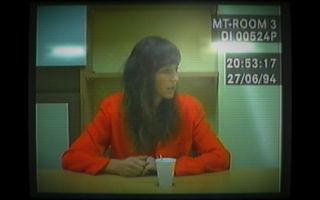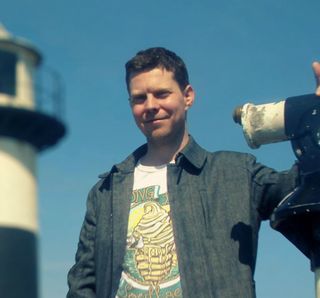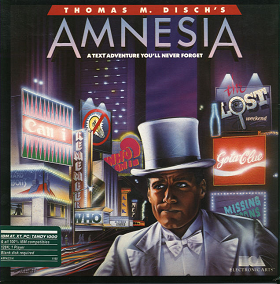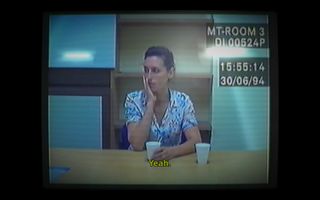

Sam Barlow is a classic example of the ultimate but rare indie success story. After 12 years at Climax Studios, where he worked on Silent Hill: Origins and Silent Hill: Shattered Memories, he bet his savings on the indie dream and won. His first independent game, interactive murder mystery Her Story, was a critical and commercial success. We awarded it Most Original game of 2015, and at the BAFTA Games Awards next month it’ll compete with heavy hitters like The Witcher 3 and Metal Gear Solid V in seven different categories.
We spoke with Barlow at the Game Developers Conference in San Francisco, where Her Story won the IGF Seumas McNally Grand Prize and an armful of Game Developers Choice Awards: Innovation, Handheld/Mobile, and Narrative. We asked him what all this success feels like, what he’s doing next, and how he’ll avoid letting the sequel to Her Story be another Serial season 2.
PC Gamer: Now that Her Story has done well...
Sam Barlow: When I said, “I’m going indie,” my mum was horrified.
PC Gamer: So mum was like, ‘Stick with AAA’?
SB: She wouldn’t even understand that distinction, but it was like going from having a job and a salary to, “So where’s the money coming from? Are we just gonna spend our savings?” And my wife Claire is working. She’s like, “It doesn’t sound like a very clever idea, Sam.” I’m like, “Well, it feels like the right thing to do.”
PCG: Your mum always knows your biggest weakness as well. You were probably having that same thought yourself: “Is this gonna be rough? Where is the money gonna come from?”
The biggest gaming news, reviews and hardware deals
Keep up to date with the most important stories and the best deals, as picked by the PC Gamer team.
SB: It’s that whole thing of being in a position of privilege, like the idea of, “What’s the worst that could happen?” We could spend the savings we had and then get a job.
PCG: A regular job?
SB: Yeah, just go back and get another job in another games company. And actually, when you are in a company like that and you’re recruiting people, someone who’s like, “I went off and did the indie thing and I made this game that didn’t sell,” usually you’re like, “Well, I respect you for actually doing something and getting off your arse and doing something cool.” So that was the worst thing that could happen.
PCG: Tell me what unfettered critical and commercial success feels like. I want to bathe in it. I want to feel what it’s like.
SB: It feels good. All the stuff that I wanted to prove with Her Story, it’s kind of proven the point. It’s like, “Yes, you can make things like that, you can tell this kind of story, you can focus this much on story.” It’s bizarre to be in these awards and it’s like, “Witcher 3, Metal Gear... Her Story.” It’s crazy, but it’s awesome. I think back just to making Silent Hill: Shattered Memories and how much we had to push on that game to do weird stuff like not have combat. And now to be able to just make Her Story and put it out there and it actually be elevated to that level, it’s a really cool thing.
PCG: Do you think, with something like Silent Hill: Shattered Memories, it’s almost impossible to do things like that which are unusual in terms of genre trappings?
SB: We got away with stuff on that game because no one really noticed. The higher-ups thought we were just doing a remake on Wii, and they were like, “Wii is selling loads. Awesome.” I think when we showed our vertical slice there was an instruction along the lines of, “Don’t have anything in it that’s gonna alert them. They should be able to look at this and feel that we are doing this straight remake.”
PC and mobile are kind of similar in that you can just do anything and people will be interested. And acceptance of Her Story within the hardcore gamers on Steam, they are genuinely excited to be playing something that feels different. You read the people who are negative about Her Story that haven’t played it, this minority of people that are annoyed this game exists. You just turn around and go, “Look, it’s got a 90-something percent approval rating on Steam. Look at the people who have actually played it on Steam. They’re all enjoying it. It’s not that out there and weird a thing.”
PCG: Do you think a game like Her Story, and other similar kinds of games, are bringing people into this more narrative-heavy, personal genre and helping them stick around? There’s a couple of people I know who I wouldn’t have expected to play Firewatch, but did and loved it.

SB: It’s a weird thing, doing Her Story again, I was looking back at precedents and old games. There’s this game Portal—not the big Portal—that Activision put out in 1986, that was this weird database story thing. You look back and you’re like, ‘Oh my God.’ You kind of sometimes forget that people have always been doing weird quirky awesome things, and there was a moment in the '80s when people like Activision, EA I think did Amnesia, again not the famous Amnesia, and these companies were going out and bringing in authors, going, "This is the new digital novel," and trying to do awesome progressive things, and that didn’t really work, and then we forgot about it and moved on.
So there’s always the chance that things are cyclical and people will forget, but it does kind of feel now that games are just broad enough, and I think it’s slightly generational as well. People have just grown up playing games, they’re used to games, and so I think there’s a general broadening. As well, all the different devices, just the fact that we sit and use the internet to do all the shit we do now. When I grew up, a computer was a thing you played games on and that was it, and then my dad would say, ‘You could also use it as a word processing application.’ I was like, ‘But dad, we don’t have a printer. That’s the most pointless thing ever.’ Whereas now, everything is computerised.
I’ve had all sorts of weird people reaching out, from big TV networks, film people, book publishers… book publishers seem to be slightly further ahead, because their industry is dying more rapidly.
PCG: What’s your life been like since the game came out, beyond scooping up sackfuls of awards? What have you been doing with your time?
SB: Yeah, scooping up awards is quite time consuming.
PCG: It’s taken a brutal toll, I can tell.
SB: It’s been fun though, because I’ve had all sorts of weird people reaching out to me, from big TV networks, film people, book publishers, all people that are generally in the business of telling stories but have no understanding or knowledge of or experience of games. It seems like all of them have this remit, “We need to figure out what this digital thing is.” I think book publishers seem to be slightly further ahead, I think because their industry is dying more rapidly. So they’re all there, willing to spend money to do this kind of stuff.
PCG: What do they want you to do for them?
SB: There’s the more boring conversations that are like, “We represent this really famous author. Could we just reskin Her Story with their stuff?” The more interesting conversations are them going, “We should collaborate. Let’s talk and have conversations, share ideas to figure this thing out.” One of these calls was with this company Interlude in New York run by this guy Yoni Bloch. When this was set up, my wife thought it was one of those Nigerian prince email things, because I was like, “There’s this Israeli rock star who runs a company in New York who’s gonna fly me out to talk to him about interactive storytelling.”

Tech pioneer and Israeli music star, now working with Barlow.
Basically, and Yoni tells this story well, he was a geeky kid and his dad was a physicist, so they had a really early computer, so he was on all the bulletin board stuff, and he got into the cracking scene and uploading music, and then he had a band of his own and he would upload his own band’s music onto all the filesharing systems, and within Israel his band got a following through this, and he leveraged that to a music deal, and he was pretty big. He was saying if you were a teenage girl in Israel at a certain time, he would be a big deal for you. At one point, he wanted to do an interactive music video for one of his songs, but they couldn't find tech that was good enough to do it or seamlessly stream it. So he had got some people together to create this technology, and then that got spun out into a company.
So what they’ve done historically, they’ve done lots of music videos, advertising things, some interesting little projects, but now they’re kind of moving into a new phase where they are creating a focus on storytelling, episodic series, interactive TV series, and that’s something that they talked to me about. Coming off of Her Story, I had this big question that was like, ‘Obviously Her Story has been insanely profitable for me. What do I do next? I’d like to do something much bigger and more expensive,’ because obviously when I was doing Her Story I was being super frugal.
PCG: You shot Her Story in a couple of weeks, right?
It was a week. We shot it through the week. It was very intense. To some extent, it was a proper "indie" indie game. The idea was that if I want to do something bigger and more expensive, and this audience I’ve found of gamers who want something different and people who’ve never played a game before, this interesting audience, I want to do something for them again, but then it was like, ‘How big can I go with this? Am I gonna be able to sell ten times as many copies now people know what’s going on? Can I charge three times as much money?’
What Interlude is focused on is the idea of it being interactive streaming video, so it could be deployed anywhere. It could be in a Facebook page. It could be baked into an app or something. We were talking about it might be interesting to do a Steam version of one of these shows, just to see how people interact differently coming from those different places. But for me that was this cool idea that I could create something with all the interactivity I wanted that would just live and have this broad reach. So that was interesting, and we started talking. A project has been announced about this opportunity they had to work with MGM to reboot the WarGames movie. I probably can’t say too many details about it, but it’s an awesome thing. The funny thing was my initial in-the-moment reaction, coming from video games was, ‘Movie tie in. That’s a bad thing,’ but then I thought about it for a second.
PCG: There are a few good ones.
SB: Yeah. But thinking about it, it was like, “There has never been a better time to update that movie,” because that was the movie that invented the concept of hacking for a different audience and was all about the Cold War, the technology and the military, and then you look around now and you think about the hacking scene, what is happening with activism and hackers, that’s interesting, and then you look at the military and you think about the war on terror, technology, drone strikes, surveillance of citizens, Snowden.
And then we were talking about how the interactivity would work, and that’s probably something I’ll have to wait until we have something to show to talk through, but we’ve got this really interesting unique angle on how the interactivity works. If you’ve played Shattered Memories and you’ve played Her Story you’ll be like, “Oh, this makes sense that there’s a throughline with how this works,” in terms of being not that kind of hit-you-over-the-head interactivity that you sometimes get of, “Make this choice. A? B?”, but more like in the way Shattered Memories kind of was essentially personalising the experience for you, sometimes explicitly, sometimes implicitly, the way that Her Story feels kind of organic and personal, doing something like that. So it’s a really interesting project.

PCG: Is working on that your day job? I know you teased through Twitter a potential Her Story sequel.
SB: At the moment we’re trying to figure out exactly where and when and how that happens, but it’s definitely gonna happen. It kind of helps, actually, because coming off Her Story I really wanted to do something else for that audience, and part of me was like, “I don’t want to repeat the trick.” When I had the initial idea for Her Story, after thinking about it for ages but when it was fully formed in my head, I was like, “It just works so nicely. This is how I’m gonna shoot it. I can see how the interactivity is gonna work. I loved text parser games in the old days and this is a way of having some of that magic without all the annoying stuff.”
So I really didn’t want to move forward unless I had an idea that was that good. But then when the Interlude thing came along and we set that up, it was like, “OK, I’m doing this cool interesting exploratory stuff with Interlude. Maybe now I’m happy if I do do something that is more in line with being a sequel to Her Story. I can kind of make peace with that now, and explore that. Without feeling like I need to reinvent the wheel, I can do something that feels like a natural next step from the original Her Story.”
PCG: When do you think we’ll be likely to hear or see more about that? Is it a long way off?
SB: Probably. It’ll be like with the original Her Story where I couldn’t show that game until it was finished. It’s brilliant to be here and win all the independent game awards, because when I was making Her Story in secret I was just thinking, “What am I doing? I’m doing it all wrong. This is not how you make indie games. For indie games you game jam, you prototype, you iterate, you share it with people, you do early access, you take it to festivals. People play your crude unfinished game, and you get feedback, and you create awareness around your game,” and I couldn’t do any of that. Until it was finished, there was no way of proving this thing was gonna work.
...the new thing, it isn’t a murder mystery. It’s probably in the space of crime-ish. There are police involved.
PCG: I remember when we talked before we discussed different crime stuff, and Serial. Obviously they went from having a massive breakout success and then their second series was significantly less popular, and I think a lot of that is to do with how they effectively dispensed with the mystery and crime elements. With Her Story, we talked about procedural police stuff. People love that kind of thing. When you say you want to do something similar, do you anticipate you still need to have a mystery?
SB: So, yeah, the new thing, it isn’t a murder mystery. It’s probably in the space of crime-ish. There are police involved. So there will be a kind of central hook. The example you gave I’m super aware of, as much as Her Story wasn’t necessarily ultimately a crime whodunit as much as it was a character study, which was kind of the Trojan horse thing, right? The second series of The Killing did a similar thing where The Killing was a serial killer thing and it was really dark and awesome.
PCG: And in the second series it took on a much more political theme.
SB: And the core thing was set in the Middle East, and it was weird. And they stepped back again for the third series of The Killing, right? And Serial is similar. And this is a similar shift, but I think there’s enough excitement in the premise, and cool stuff going on in it. And I think actually that was kind of the problem with Serial, [that in the first series] there was this core unanswered question.
PCG: I feel like it was a mistake for The Killing to change focus.
And they stepped back [from politics] again for the third series of The Killing, right? I’m mindful, and Serial is similar. And this is a similar shift, but I think there’s enough excitement in the premise, and cool stuff going on in it. And I think actually that was kind of the problem with Serial, was that core unanswered question.
PCG: Everyone knew what happened to Bowe Bergdahl, but they weren’t as interested in why it happened.
SB: So [Her Story 2] will have the question, and some drama and lots of other things... I’m being super vague here.
With over two decades covering videogames, Tim has been there from the beginning. In his case, that meant playing Elite in 'co-op' on a BBC Micro (one player uses the movement keys, the other shoots) until his parents finally caved and bought an Amstrad CPC 6128. These days, when not steering the good ship PC Gamer, Tim spends his time complaining that all Priest mains in Hearthstone are degenerates and raiding in Destiny 2. He's almost certainly doing one of these right now.
Most Popular


